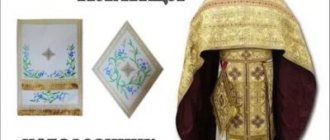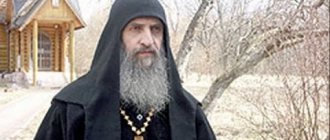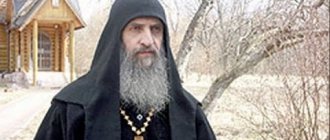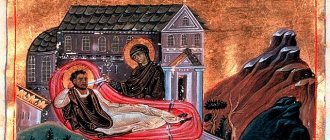Priest
- a clergyman belonging to the second, middle degree of priesthood.
Has the grace to perform all the sacraments, except the sacrament of Ordination. Otherwise, a priest is called a priest
or
presbyter
(Greek: elder; this is what a priest is called in the epistles of the Apostle Paul).
Ordination to the priesthood is carried out by the bishop through ordination.
The priest is the celebrant of the six sacraments of the Church (baptism, confirmation, Eucharist, penance, marriage and consecration of oil) for all his parishioners; he is the closest teacher of his parishioners, from the church pulpit in the temple, when visiting their homes and in all meetings and conversations; he is a preacher of the religious principles of life, but at the same time a canonically obliged defender of all knowledge (for example, medical, agricultural and home economics), mental and moral education and upbringing that is not contrary to religion and the public good. The rights and duties of a priest are set out in detail in the special science of shepherding, which the future shepherd undergoes during his training, as well as in church laws and rules.
It is officially customary to address a priest: “Your blessing”; to a monastic priest (hieromonk) - “Your Reverence”, to an abbot or archimandrite - “Your Reverence”. Informal, colloquial address - “father Name” or “father”. The address “holy father”, which is common in the West, is not used by the Orthodox.
Who was the first Christian priest?
This is unknown. But already in the book of Acts “church elders” are mentioned in Ephesus, who were not bishops, like the disciple of the Apostle Paul, Timothy. In the first centuries there were chorepiscopes, that is, “rural bishops.” Often chorebiscopes and presbyters differed little. The deepest antiquity is still noticeable in the deacon’s exclamation “Bless, Master” when addressing a priest, and not a bishop. In the Byzantine tradition, the priest is clearly ordered to sit in a headdress (nowadays kamilavka or miter) while reading the Apostle at the Liturgy, which signifies the “equalness of the apostles” of the priestly service. In the earliest canonical rules there is a constant confusion of the concepts of bishop and presbyter; it is almost impossible to distinguish between them.
How to contact priests
Within each of the three hierarchical levels there is its own hierarchy. The Sacrament of the Priesthood is performed only when the candidate is elevated to the next of the three levels. As for the hierarchy of titles within these levels, in ancient times they were associated with special church obediences, and now - with administrative power, special merits, or simply the length of service to the Church.
The word "priest" has several Greek synonyms.
For the white priesthood:
- Priest (priest; from Greek hierуs - sacred).
- Presbyter (from Greek presbyteros, literally – elder)
- Protopresbyter (first elder)
- Archpriest (first priest)
For the black priesthood:
- Hieromonk (monk in the rank of priest)
- Hegumen (from the Greek hegumenos, literally - going ahead, leader, commander), in ancient times (and in the modern Greek Church) only the abbot of the monastery; in modern practice of the Russian Church, the title can be given to simple hieromonks for special merits and after a certain period of time service to the Church.
- Archimandrite (from the Greek archon - head, elder and mandra - sheepfold; literally - elder over the sheepfold), that is, the elder over the monastery. The word “mandra” was used to describe monasteries in Greece. In ancient times, only the abbot of one of the largest monasteries (in the modern Church of Constantinople and Greece this practice is preserved, however, an archimandrite can be both an employee of the Patriarchate and an assistant to the bishop). In modern practice of the Russian Church, the title can be given to the abbot of any monastery and even simply to abbots for special merits and after a certain period of service to the Church.
The words pop and protopop stand apart. In Rus', these words did not have any negative meaning. Apparently, they come from the Greek “pappas”, which means “daddy”, “father”. This word (due to its prevalence among the Western Slavs) probably came into the Russian language from Old High German: pfaffo - priest. In all ancient Russian liturgical and other books, the name “priest” is constantly found as a synonym for the words “priest, priest and presbyter.” Protopop is the same as protopresbyter or archpriest.
As for appeals to priests, they exist official and unofficial. Unofficially, priests and deacons are usually called fathers: “Father George”, “Father Nikolai”, etc. Or simply “father”. On official occasions, the deacon is called “Your Reverence,” the presbyter “Your Reverence,” the protopresbyter “Your Reverence.” When addressing a bishop, they say “Vladyka” (Vladyka George, Vladyka Nikolai). In the Russian Orthodox Church, when formally addressing a bishop, he is called “Your Eminence,” while archbishops and metropolitans are called “Your Eminence.” The Patriarch is always addressed: “Your Holiness.” All these appeals relate not to the person’s personality, but to his ministry.
Where did the Sacrament of Priesthood come from, how did it come about?
It came from our Lord Jesus Christ Himself and His apostles. The Apostle Paul asks his disciple Timothy: I remind you to rekindle the gift of God, which is in you through my laying on of hands (2 Tim 1 :6). If this were not in full accordance with the words of the Lord, the Apostle Peter and other closest disciples of Christ would certainly have opposed and prohibited this practice. The early Christians did not leave detailed comments on this issue in writing: everything was clear and obvious to them by default. And we sacredly preserve this Apostolic and church-wide Holy Tradition.
Confessor - who is this?
People who are not sufficiently familiar with the life of the Orthodox Church, but have Orthodox acquaintances, can often hear the word “spiritual father” in their speech. For example, “my confessor said...”, “my confessor advised me...”, etc. Non-church people, hearing this, may think that there is another special level of priesthood in the Church. This is wrong. The confessor is the same priest or bishop (which happens much less frequently due to their enormous administrative burden). The only peculiarity of a confessor lies in the nature of the relationship between him and a specific parishioner of an Orthodox church. For example, for confession a person can approach any priest in any church.
However, if we are talking not only about performing the Sacrament of Confession (forgiveness of sins on behalf of God), but also about receiving advice, about additional conversation, help in solving various issues and difficulties in the life of a Christian, the parishioner naturally strives to find a priest with whom in the future his church life will be connected. If a priest, in turn, delves into and knows all the problems of this person and helps resolve them from a spiritual point of view, shares with him the spiritual experience of life in the Church, then he is called a spiritual father or confessor, and the parishioner, respectively, a spiritual son or spiritual daughter . The very name “spiritual father” is due to the fact that it is he who helps a person to be spiritually born, that is, to experience for himself what real spiritual life is and how to live it.
The presence of a confessor is not a mandatory condition for a person to remain in the Church. However, without a confessor it is very difficult to adopt the living experience of spiritual life. The influence of the confessor is based solely on his authority with the spiritual son (or daughter) and does not have any formal consequences for the salvation of a person.
magazine "Foma", 07.16.05
Who is a confessor and how do you become one?
One becomes a confessor upon visiting a particular temple. You go and confess, and the one who confesses you becomes your confessor. If you are dissatisfied with him, pray more fervently, God will send you that confessor who will be more understandable, responsive, and with contrition of heart. In the old days, confessors were appointed from experienced and old priests or monks. We still have two confessors for the clergy of the city of Moscow. We also need regular confession. But from an ordinary confessor, neither eldership nor indispensable holiness and insight are required, but only that he himself be humble and simple, with contrition of heart, without exaltation over the parishioners, who prays and fasts, that is, the most ordinary and simple priest we have , thank God, there are many more.
On the screensaver: photo by Vladimir Eshtokin
Where did priests come from?
At all times, in all religions, there were people who were called “clergymen” in Soviet textbooks. In fact, they could be called differently, but the main thing was that these people played the role of intermediaries between a person and the spiritual forces that he worshiped. “Servants of the cult” prayed to these forces and made sacrifices to them. Although the priesthood existed (and exists) in most religious systems, the spiritual forces with which they deal are different. Therefore, it is very important to know to whom the sacrifice is made, to whom exactly this or that people worships.
In this regard, the Orthodox clergy has no connection with pagan priests, shamans, etc. They recognize their kinship with the priesthood of the Old Testament Israel, because the priests who, together with the prophet Moses, led the Jews to the Promised Land, worshiped the same God who is worshiped and Christians to the God of the Bible.
The priesthood of the Old Testament appeared almost 1500 years before Christ, when the Jews emerged from slavery in Egypt into the Promised Land. Then, on Mount Sinai, God gave Moses the famous Ten Commandments and many other laws that determined the religious and civil life of Israel. A separate chapter dealt with the place where the Israelites were supposed to make sacrifices to God, as well as the people who had the right to do this. This is how the tabernacle first appeared - a camp temple where the tablets of the Covenant were kept (two stone tablets on which the Ten Commandments were carved by God), and the ministers of the tabernacle. Later, following the model of this tabernacle, King Solomon built a huge temple in Jerusalem. All Israelis participated in the service, but only the priests could perform it. Moreover, just like the New Testament priesthood, the Old Testament priesthood was structured hierarchically, but it also had a significant difference - it was hereditary. For Orthodox Christians, the connection with the priesthood of the Old Testament is living and immediate. In Orthodox churches you can see icons of Old Testament high priests and priests. For example, children are still baptized with the name of the Old Testament priest Zechariah (Father John the Baptist).
The New Testament priesthood comes into being as a result of the coming of Jesus Christ into the world. New Testament priests serve the same biblical God. However, the way and meaning of their ministry changed. If in the Old Testament all sacrifices were tied to a specific place: they could only be offered in the Jerusalem Temple, then the New Testament sacrifice to God ceased to be associated with geography. The nature and essence of the sacrifice changed. In all religions, at all times, among all peoples, a person makes a sacrifice to the gods and their subsequent response to it is expected. In Christianity, on the contrary, God sacrifices Himself for people, literally sacrifices Himself on the Cross. Having made this sacrifice, the Lord awaits a response from man... It is with Golgotha that the ministry of the New Testament priesthood is connected. During the main Christian service - the Liturgy - through the prayer of believers with a priest at the head, Christ Himself makes a sacrifice, offers Himself. Then Christians unite with the Savior, partaking of His Body and Blood.
The biblical book entitled “The Acts of the Apostles” gives an idea of how the Church grew and developed in the first thirty years of its existence, how its three-tier hierarchical structure gradually took shape, which we see to this day. The first whom Christ blessed for the New Testament priestly service were His twelve closest disciples. In another way they are called apostles. From Greek this word is translated as “messenger”, or “envoy on a special mission.” This mission consisted of three things: priesthood, teaching and governance of the Church.
At first, the apostles did everything themselves - baptized, preached, dealt with a variety of economic issues, collecting and distributing donations, etc. But the number of believers quickly increased. Therefore, it was decided that economic and material issues would henceforth be dealt with by specially selected representatives of the community, so that the apostles would have enough time to fulfill their direct mission - performing divine services and preaching the Risen Christ. Seven people were elected who became the first deacons of the Christian Church (from the Greek diaconos - minister). A deacon is the first hierarchical level of the priesthood.
When the number of believers already reached thousands, twelve people were physically unable to cope with either the sermon or the sacred rites. In large cities, the apostles began to ordain people on whom they actually entrusted their functions: priesthood, teaching and administration. These people were called bishops (from the Greek - episcopos - overseer, overseer). The only difference between the bishops and the first twelve apostles was that the bishop had the power to officiate, teach and govern exclusively on the territory of his diocese (from the Greek eparchia - region, possession). And this principle has been preserved to this day.
Soon the bishops also needed helpers. The number of believers grew, and the bishops of large cities were physically unable to cope with the load that fell on them. Every day they had to perform divine services, baptize or perform funerals - and at the same time in different places. Therefore, bishops began to appoint priests to serve. They had the same power as bishops, with one exception - priests could not ordain people and performed their ministry only with the blessing of the bishop. Deacons, in turn, assisted both priests and bishops in serving, but they did not have the right to perform the Sacraments. In the Ancient Church, deacons played a huge role as the closest assistants and confidants of bishops, but gradually in the Orthodox Church their importance was reduced only to helping priests during divine services. After some time, a tradition developed that only those people who were first ordained to the diaconate became priests.
Priests are also called shepherds. This word does not indicate that all other Christians are a flock of silent sheep. A pastor is a measure of responsibility before God for every person a priest meets in his life. And the power of the priest always borders on this responsibility. Therefore, it is to the clergy, first of all, that the words of Christ are addressed: “To whom much is given, much will be required.”
A joke about rain and a priest
A guy comes to church: “Holy Father, I need to confess!” - Come on, son, ease your soul! - Well, last week I helped my friend assemble a wardrobe. We had just picked it up when it started to rain. She suggested: “Where are you going to go in this rain? Stay!” Well, I stayed and fucked her. A few days ago I helped a friend’s wife glue wallpaper. They had just glued the last piece when it started to rain. She says: “Where are you going to go in this rain? Sit for now, wait it out.” And I fucked her... And yesterday I was helping a friend repair his car in the garage. As soon as the repairs were completed, it started to rain. He says: “Well, where will you go in the rain? Stay, let’s have a drink!” Well, we got drunk and I fucked him too. What should I do now, father? - Get the fuck out of here before it starts raining!..
Who is in charge in the temple?
It is important to remember who is in charge in the Church. Coming to the temple, we see the priest, but we do not see God. He is invisible to man, but it is Christ who is the head of our Church, everything is for His sake and everything leads to Him. I am categorically against a priest being adored and given special honor. Yes, it is easier to build a relationship with him than with God, but we are called to something else.
In Soviet times and until today, the most accessible way to communicate with a priest was and remains a meeting at the lectern during confession, where you can not only repent, but also share pain and ask for advice. This tradition was formed during the years of the USSR, when at other times it was not possible to talk with the priest. Now people can contact the priest at any time.
A priest is not a strict teacher or judge who will scold, execute, or pass sentence. He is more of a fellow sufferer. The Lord specially appointed ordinary sinners as priests so that they could understand and accept man. They live the same lives, have the same life experiences and understand their parishioners. Their task is to learn to receive the flock, as Christ did. People are drawn to such priests. It is no coincidence that we are called priests - because a priest is truly like a father: he will understand, and forgive, and give advice, and scold, if necessary. He establishes a spiritual relationship with all parishioners, and it is even higher than blood relationship.
Often people believe that they are confessing to a priest, but this is not the case. We all confess to God, and the priest is only a witness of repentance. He was given the power to forgive sins - that’s why he utters the words of a prayer of permission: “May our Lord and God, Jesus Christ, by the grace and generosity of His love for mankind forgive you, child (name), and I, an unworthy priest, by His power, forgive me and give you permission from all your sins, in the Name of the Father and the Son and the Holy Spirit. Amen". We need to cherish this sacrament - like all others, because man sins every day.
Faith and Church are alive
Our people are Orthodox at the genetic level. Yes, now there are more unchurched people, but many still find their way to our Church, are baptized and baptize their children, strive to perform funeral services for their relatives, and seek help in solving various life issues. Most of the inhabitants of our country, even if not regularly, on holidays, go to temples. People feel where a priest is sincerely engaged in his work, and they are drawn to such a priest. A priest is expected to be a believer, caring and selfless. I have always been surprised by the fact that even non-church people always very subtly feel the lack of these qualities in a priest.
I am glad that modern people still find their way to the temple. How much effort was put into destroying the Church, how much dirt was spilled, how often they tried to discredit it! How powerful the Soviet propaganda machine was! This continues now - in the media, on the Internet. Nevertheless, faith was not eradicated. Yes, there are not as many parishioners in churches now as we would like, but this is a tribute to the times: life in Ukraine is very difficult, the country has a high mortality rate, many different problems, but still the Holy Orthodox Church is dear to the majority of our citizens.
Old Testament Priesthood
The priesthood is a very interesting and specific phenomenon, known since the Old Testament, and even before the Great Flood. Speaking about priests, I mean the servants of the Living True God, and not all kinds of shamans, priests, pagan ministers and the like. The Old Testament priesthood is divided into two periods: before Moses and after, when a qualitative change in the priestly ministry took place.
Before Moses, a priest could be the head of a clan, a prince, or an elder. For example, Abraham made sacrifices to God while he was a prophet. He lived the ordinary life of a nomad when he left his hometown. He was the head of his clan and at the same time offered prayers and communicated with God. Job the Long-Suffering was the same priest. It is said that he offered sacrifices for his children, and therefore combined the functions of the head of the clan and the priest. I would especially like to draw attention to Melchizedek, king of Salem (Salim is the ancient name of Jerusalem), who was also a priest of the Living God. When Abraham was returning from a military campaign to free his nephew Lot, Melchizedek met him and presented him with bread and wine, becoming a type of Christ.
During the time of Moses the situation changes. The Lord ordered him to appoint his brother Aaron as priest. Then the priesthood became a separate class. The task of the priest is to perform the prescribed prayers and religious worship in general. He is purely concerned with the temple, worship and everything connected with it. The priesthood existed in this form until the time of Christ. We know that then there were priests, high priests, Levites. It was impossible to become a priest - they had to be born, to be from the line of Aaron.
In ancient times there was no need to separate the priesthood into a separate class. People lived a subsistence economy, a simple life in which little changed. As society developed, the division of labor and the emergence of class relations, the priesthood became a separate class, which dealt exclusively with religious issues. From then on, the priesthood began to play an important role in the life of a society that had long been religious. To one degree or another, faith permeated and determined relationships in society. In the secular society we live in now, this is not the case.
About multitasking
In modern life in a parish, the priest is entrusted with many diverse functions and tasks. If you look at the charter, then the rector has about twelve duties that he must fulfill: perform the holy sacraments, regularly conduct divine services, teach the word of God, monitor order in the church and the quality of singing so that everything is in accordance with church tradition, represent the Church in various spheres of secular life and so on. The priest is the organizer of parish life, the core on which so much rests. In those places where wise priests serve, the parish flourishes and develops.
“The priests are joking” - a selection of funny and touching stories
A wonderful selection of touching and funny stories from the lives of priests, collected on the Internet.
Chapter 17 from Mark
One day, after finishing the service, the priest said: “Next Sunday I will talk with you about lies. To make it easier for you to understand what will be discussed, read the seventeenth chapter of the Gospel of Mark at home before this.” The following Sunday, before the beginning of his sermon, the priest announced: “I ask those who have completed the task and read the seventeenth chapter to raise their hands.” Almost all the parishioners raised their hands. “It’s with you that I wanted to talk about lies,” said the priest. “There is no seventeenth chapter in the Gospel of Mark.”
Fairy Pilgrimage
Once, during a pilgrimage to Optina Monastery, the famous monastery, the novices observed the following picture. A little boy approaches Father Venedikt, the abbot of Optina: he has arrived with his family and wants to take a blessing from the abbot’s father. The following dialogue takes place between them:
- Hello, Venya’s father... Vini... (can’t pronounce the name).
And he affectionately pats him on the shoulder and says:
- Hello, Piglet!
"Bitterly!"
Once upon a time, a wedding of a young couple took place in the university house church. As expected, after the wedding a meal was organized, where the rector, parishioners of the temple and friends and classmates of the newlyweds were invited.
The bride was very worried and, blushing, warned all her friends in advance: under no circumstances should they shout “Bitter!” during the festive dinner. She persuaded, exhorted, conjured - they say, it is indecent to kiss in a temple. The friends laughed and teased in response, but in the end they agreed.
And now the moment has come when the festive feast began. The abbot raised the first toast. Wishing the happy couple a long and prosperous summer, he loudly shouted: “Ho-o-orko!” An explosion of laughter followed; the crimson bride had no choice but to kiss her husband, who could barely contain his laughter. They laughed at this story for a long time.
At the reception with the Archangel
From the priest’s story: There was such a case in my church life. Once, when I was a deacon, a man in a formal suit with a leather folder in his hands came to the icon shop of our monastery, which was located not far from the diocese. The saleswoman, seeing me, pointed to a respectable gentleman who, apparently, had come on an important mission.
- Excuse me, how can I get an appointment with Archangel Gabriel? - the visitor asked without blinking an eye.
Just imagine my condition! Barely holding back my laughter, I thought about how to more delicately answer a high-ranking person that during his lifetime the archangel appeared to few people, so a mere mortal, in order to get an appointment with him, needs to at least die. But, having overcome the temptation, he led him to the door of the administrator of the Annunciation diocese, Archbishop Gabriel.
It immediately became clear to me that the poor official, apparently, mixed the regalia and the name of the ruler with the inscription on the church “Temple in honor of the Holy Archangel Gabriel and other Heavenly Powers.”
Blessing of the Bear
One day, in the winter, young novices from one of the Annunciation parishes flocked to the refectory for dinner. It was getting dark. Suddenly one of them heard a suspicious creak of snow under the fence. The heavy steps of someone very large were slowly approaching.
The novice was wary, since his obediences also included security functions. He looked, and a large shaggy hat appeared over the upper edge of the blank fence and came up to the gate, locked with a padlock. Someone from the other side pulled the gate with force, but it did not give way.
- What kind of bear is that breaking in there?! - the frightened novice shouted for warning. In response, from under a large shaggy hat, someone grunted strainedly and went home, his huge feet creaking in the freshly fallen snow.
A short time later, a bishop's service took place in the parish church. At the All-Night Vigil, at the appointed time, all the priests and altar servers moved in a line to receive the blessing of the ruling bishop. He approached him, not forgetting to cup his hands, and the novice squeezed out: “Bless, Vladyka.”
Archbishop Gavril looked at him sternly from under furrowed eyebrows and through his waterfall-shaped mustache said: “The bear will bless you!”
Many years
Many years, beginning with the words “Many years,” is a solemn chant in the Orthodox Church, a form of wish for long life and prosperity, very often sung during a meal in order to congratulate someone on a festive event. One foreigner, present at such a congratulation, asked the priest:
“Tell me the secret of why when you pour a glass, you stand up and sing “Is this too much?”
A short confession
From the story of one parishioner: Before confession, the grandmother squeezes through: “Let me skip the line, I only have 2 sins.”
Orthodox atheists
From the priest's story: The car skidded. Winter. I look: the men are standing nearby. I'm going out and asking for help. They: “No, father, we won’t help. We are atheists." “What kind,” I say, “are atheists?” After all, atheists are different. There are Buddhist atheists, and there are Muslim atheists.” They responded: “No, what are you talking about, father, we are Orthodox atheists!” As a result, they helped, of course.
Pop star
One priest I know said: “Do you know what we call priests who actively give interviews, write blogs, and appear on TV? Pop star!"
Monastery Hound of the Baskervilles
Father Andrei once went to Optina Pustyn. First time. I got to Kaluga, from there to Kozelsk, crossed the bridge over the Zhizdra River and walked on foot through the forest to the monastery. It suddenly got dark quickly. The road went uphill, along the sides there was a tall pine forest, with a starry sky above. He walks through the twilight tunnel, marveling at the beauty of God.
The darkness gradually thickened, and fear began to attack him. And suddenly he sees: either a small horse or a huge dog with burning eyes is flying towards him. From horror, Father Andrei was dumbfounded and speechless! Should I throw myself into a ditch? But he’ll bite him anyway, look what! Climb a tree? I won’t have time (Father Andrei is very tall and heavy).
The distance was shrinking catastrophically, and there was no more time to think. Obeying some kind of animal instinct of self-preservation, Father Andrei spread his arms to the sides and with a wild cry of “Ah-ah!” in a huge flowing black robe, he himself rushed at the approaching monster...
A cyclist rushed past him at great speed, his eyes bulging in horror.
“Dad, pray!”
When Father Nikifor was still a novice priest, he was assigned to the sorokoust ("young fighter course" for newly minted pastors - 40 services daily). Father Veniamin (let's call him that) was appointed head of the “practice”. A gray-haired shepherd who accepted the grace of the priesthood back in those days when, if they didn’t kill for it, then they created a lot of problems - from scrip to prison.
The parishioners called the priest with the noble church neologism “severely kind.” Irreconcilably harsh towards sin and infinitely kind to the sinner. And even when, during confession, Father Benjamin, shaking his head, tapped the neck or forehead of his lost child, his eyes shone with genuine love and kindness.
God's providence directed it in such a way that as soon as Father Nikifor took up his “pastoral watch,” his mother went to the maternity hospital to replenish her already large family.
Father Veniamin slowly, with a feeling of complete reverence, conducted the service. Father Nikifor, a fellow worker, was extremely absent-minded. Thoughts flew one after another: “How is the birth there? Like a child? How’s mother?”
At the end of the Liturgy of the Catechumens (one of the components of the Divine Liturgy), an SMS came from my wife: “The baby is very bad, they were taken to intensive care. May not survive. Pray!
In a panic, Priest Nikifor grabbed Father Benjamin’s cassock and began to shake: “Father, pray, the child is dying! Dad!!!" The miter on the head of the respected shepherd began to stagger. Father Veniamin, without batting an eyelid, got out of the bear’s clutches of Father Nicephorus, straightened his miter and calmly said: “Nicephorus, don’t panic! Now let’s pray.”
And in violation of all church canons, he stopped the Liturgy, flipped through the missal and cried out a prayer for every request, remembering his ward, his mother and the born child. At the last words of the prayer, Father Nikifor’s mobile phone vibrated again: “The baby was brought back. Completely healthy. The doctors don’t know what happened to him.”
Father Benjamin looked at his stunned brother with a smile and went around the second circle to finish the Liturgy of the Catechumens. I must say that I do not know a stricter guardian of the Charter in the diocese than Father Veniamin. You ask: how can it be that someone so strict violates the canons so easily? In response, I will only recall the words of the Lord: “The Sabbath is made for man, and not man for the Sabbath” (Mark 2:27).
Are you sure you won't drink?
One priest started renovations in his church, which had survived many harsh times. They placed scaffolding right up to the ceiling. Left alone in the temple, the priest climbed to the very top to examine the miracles of local restorers. Suddenly he sees: the door opened, and a fairly drunk man climbed into the church, almost on his knees. Wringing his hands, he began to lament loudly:
“Lord, if You exist, save me from this infection, I can’t drink anymore. Well, do something, Lord! »
The priest from above boomed in a thunderous voice (and I’ll tell you, his voice really is like this): “Are you sure you won’t drink?!”
The little man fell to his knees: “I won’t, Lord, I won’t!!!”
“Well then, go in peace,” came the answer.
It is unknown how this story ended, but the priest, telling it to me, concluded that the Providence of God, which took such a strong hold of the peasant, was unlikely to abandon him.
Eastern guru and sausage
Russian people love anything exotic. Whether this is a sign of the universal breadth of our soul, which Fyodor Mikhalych wrote about, or our utter stupidity, which all the great writers wrote about, I don’t know. I know that it constantly pulls us to no one knows where and no one knows why, but certainly to our own heads. So I always wonder why Russian people go somewhere to India, pay thousands of dollars to fall at the feet of some dubious guru in some dubious ashram for an hour and a half.
The residents of Arkhangelsk are no exception, and we have been toiling with sects of all stripes for almost three decades now. But it seemed that it couldn’t be simpler: if you want severe asceticism, spiritual wisdom and states of grace, get in a car or take a train ticket and you will soon have the first, the second, and the third. 8 hours of chopping wood in the cold and 10 hours of washing dishes in the monastery refectory - and with your own body you will feel the feats of the great fathers of antiquity. You’ll gain a couple of years’ worth of wisdom, if not from the monastery’s thousand-volume library, then from conversations with experienced brethren.
Having stood for 6 hours at the statutory service, confessed and received the Mysteries of Christ, you will find grace such as humanity had never known before the Coming of the Lord into the world.
But this is all a saying, and now it’s a story itself.
My old friend N. once studied at one of the prestigious universities in the capital. And, as is typical of a young, talented and restless nature, he was in a constant spiritual search. On these turns he was carried nowhere, but into one of the many pseudo-Hindu sects. Well, since my friend hated hypocrisy more than anything in the world, he threw himself into his new hobby with all his might. He became a strict vegetarian, gave up all types of psychoactive substances (including harmless tea and coffee), forgot even about friendship with girls and read 2.5 thousand mantras on his rosary every day, reverently looking at the portrait of his beloved guru above his bed in the university dorm.
My fellow students, who had chosen the triad “beer, ladies, rock and roll” as their life credo, looked at my friend’s hobby with a dose of good irony: they say, everyone goes crazy in their own way.
How a Hindu ashram and the Temple of Bacchus and Venus were combined in one tiny room can only be known by students of the legendary 90s - a generation that is basically impossible to surprise with anything.
The stipend for the granite-eaters was even more tiny than a dorm room. It was enough for exactly two days of revelry, and then the harsh everyday life of searching for “food and drink” began. My friend, due to his absolute sobriety and meager diet, managed to stretch out the scholarship for a week, but the inevitable question: “how can I continue to live now?” - soon rose with all his frightening directness.
One day the limit came. There was nothing to eat, there was no one to borrow from, and the Hindu god ignored both the reading of mantras and intense meditation, leaving his faithful follower to the mercy of fate. My friend was wandering around Moscow in a darkened state of consciousness and suddenly, raising his eyes to the sky, he screamed inwardly:
“Lord, if You exist, reveal Yourself. Well, it’s impossible to do this anymore, how much can you suffer!? I now need to leave the university where I entered with such difficulty!! And in general, I might die of hunger if I don’t find the money now!!!” Tears flowed, and my soul immediately felt lighter.
In the distance, the Cathedral of Christ the Savior shone with its domes. Little realizing what was happening, N. headed there. There was surprisingly no one on the street in front of the temple itself. Surprise gave way to shock when, on the sidewalk under his feet, my friend discovered two neatly folded 500-ruble bills (the average two-month salary at that time). The shock turned into joy when N. remembered the words of his first desperate prayer to the Christian God. Having picked up the money, the friend ran into the temple and lit a candle; then I went to the store and bought wine, sausage, and cheese.
When he laid out his purchases on the table in the dorm, his hungry and stunned fellow students asked only one question: “What happened to you?!” N. replied: “My friends, today I finally found true faith, let’s celebrate it!” Then he went to his bed and took down the portrait of the great guru from the wall. It seemed to those present that the gaze of the eastern teacher at that moment became especially menacing.
Prayer for suitors
Many young unmarried girls went to one priest’s church. The priest successfully redirected almost everyone to the choir, because there was no one to sing in the church, and serving the Lord with their talents was not only a gracious, but also a soul-saving task. The choir, they say, then thundered throughout the entire diocese. The abbot had nothing to pay for this wonderful choir. The temple was considered so poor that none of the Arkhangelsk bishops dared to impose a diocesan tax on it. Not knowing how to thank his workers, the priest promised to marry them all off.
For some choir members, the statement of their spiritual father aroused hope, for some - irony, for the majority - a firm conviction: “father just wants to console us.” They say that young people never came to our church, but in a world seething with passions, go and find a worthy candidate for a wife. But the priest, having a stubborn character (according to rumors, the most stubborn in the diocese), began to read a prayer for the sending of suitors after each liturgy (they say there is one in the breviary).
Other fathers chuckled: look, our father is busy with love spells, begging suitors. But the priest stubbornly continued his work.
Three years passed, young people flocked to the temple. They performed one wedding, then three, then seven, then within a year it was either 12 or 15. The choir was empty. The father lamented: now, we’ve finished praying, and now there’s no one to sing! More young men began to go to church than girls.
Other priests changed their minds and already instructed their altar boys: come on, don’t be foolish, don’t go around with Gogol, but run to your father, who organized a “bride fair” in his church. I heard that five matushkas (priests’ wives) have already left that church.
Father Pushkin scholar
One priest never had a car. And when our other fathers switched from domestic cars to foreign cars and exchanged them, the priest continued to walk the mortal earth on foot and ride in public transport, throwing seasoned conductors into a stupor: “wow, priest, he got on the bus.”
The priest’s pedestrianism brought constant headaches to his faithful wife. Father, not only did he walk from 2 to 10 kilometers a day, but he did it in extremely impractical shoes. Not to say that for some patriotic reasons my father did not recognize Ralph Ringers or Rakers, he simply believed that it was unbecoming for the rector of a poor church to show off in expensive shoes. And cheap shoes quickly became unusable...
I remember once a priest wandered in to me: “Misha, can I warm up?” And then my feet were frozen. We looked at the shoes - and there was a hole the size of a nickel. - Father, how long have you been walking like this? - Yes, the second week. I think it’s gotten old: there’s no frost, but my feet are cold.
It happened that compassionate members of the community, knowing that the priest did not like expensive gifts, simply bought him new high-quality shoes, without, of course, naming the price. Once again, mother’s heart could not stand it: “Father, finally go to the market and buy yourself normal leather shoes with a fur base. You'll die soon! I know you can’t take it from a church circle - so here’s one from my pension!” Nothing to do. Hanging his head, the priest went to the Arkhangelsk market (the priest, it must be said, did not fully digest markets, apparently due to his aspiration for heavenly things).
He met a tipsy middle-aged man who looked like an intelligent, well-dressed anti-clerical. Looking at the hunched figure of the priest, he smiled smugly and loudly, so that all the sellers and buyers in the area could hear, barked:
- The priest went to the bazaar to look at some goods!
There was an awkward pause. Still, respect for priests is still a distinctive feature of our long-suffering people. Father was not taken aback and reacted instantly (out loud, of course):
- And Balda will meet him. He goes without knowing where!
Then the whole market crashed, people were just crying.
The intellectual glanced fearfully at the priest: “What are you doing, what?” - Yes, I’m okay. I just quoted Pushkin!
Father’s material troubles continue to this day: sometimes his jacket gets torn, sometimes his shoes come off, sometimes he completely forgets his bag on the bus. But his disposition remains the same: as cheerful as he is zealous for Bose.
Andrey Russian / My Russia
You can applaud the author (at least 10 times)221
Little horse
The priest is the smallest person in the structure of the diocesan structure, but in fact, thanks to him, everything moves. The priest is now entrusted with more and more responsibilities, because life is becoming more and more complicated: society is becoming more secular and more atheistic, we live in a situation of religious competition - there are quite a lot of “churches” around that call themselves Orthodox, as well as sectarians. A priest must respond to the challenges of the modern world, bring the word of God to parishioners, the younger generation through the work of Sunday school and youth organizations, engage in missionary work, social service, solve current issues, find time for prayer, parishioners, family, maintaining the temple - in a word, be a workhorse , which pulls a very heavy load. Fortunately, he does all this not by his own strength, but by the power of God’s grace. The Lord never leaves His priests, but always sends them people who lend their shoulder.









